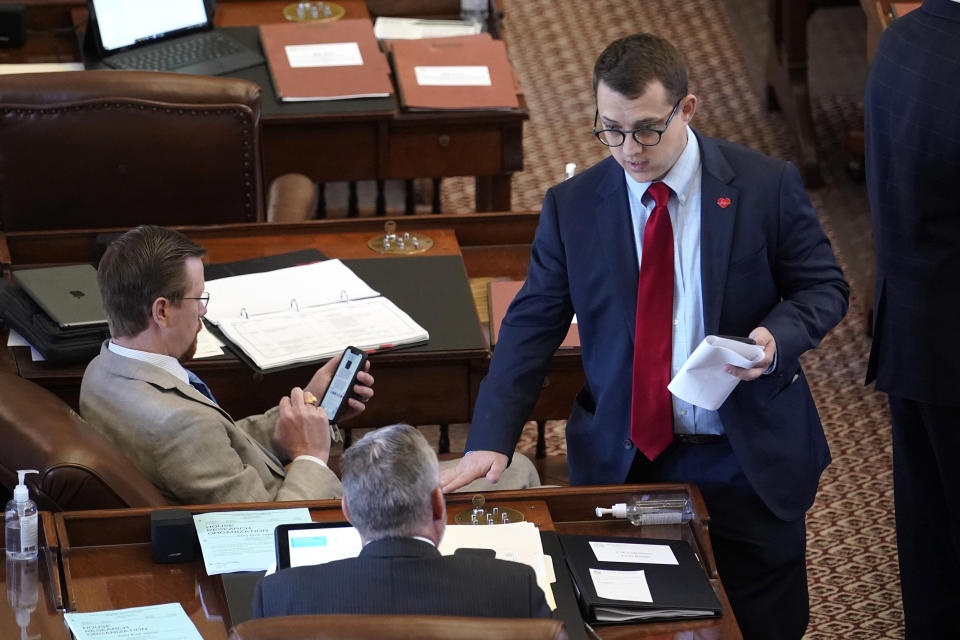Texas lawmakers advance restrictive election bill despite Democrats' all-night fight
Texas lawmakers advanced a restrictive election bill early Friday as Republicans overcame Democratic efforts to derail the legislation.
Democrats had vowed to wage an all-night fight against the bill, which they argue would suppress voting and disenfranchise voters of color. Republicans led by Rep. Briscoe Cain, the chair of the Elections Committee, say the House bill would ensure ballot integrity and protect voters from coercion and fraud.
The key vote at 3 a.m. in the Texas House followed hours of debate as Democrats, who had little means of stopping the bill in the GOP-controlled state Capitol, deployed technical challenges and hours of questioning that Rep. Cain appeared unprepared at times to answer.
Finally, an agreement was reached between Republicans and Democrats leaving the bill with 20 amendments that significantly watered down some of what advocates called the most problematic aspects of the bill as it passed the key vote 81-64.
Gov. Greg Abbott, a Republican, has urged legislators to pass election legislation, which he made a priority for the session.
Thursday's debate in Texas came after Florida became the latest U.S. state to enact restrictive voting laws, with Republican Gov. Ron DeSantis signing the legislation into law live on Fox News' "Fox & Friends." It enacts restrictions on voting by mail and at drop boxes, which Democrats and activists warn could suppress voter turnout.
Former President Donald Trump's stolen election lie has inspired hundreds of restrictive election bills across the country, even though there is no evidence of widespread fraud in elections. By all official accounts, the 2020 election was secure, and the results were certified as accurate. But state legislators — many of whom joined Trump to cast doubt on the system — are nonetheless legislating to restrict the vote, arguing that new measures are needed to restore trust in the system.
Georgia passed its own restrictions in March, prompting a pushback from Democrats and activists that ultimately resulted in a handful of major corporations denouncing the move and Major League Baseball moving its All-Star Game out of the state.
The push in Texas has also prompted businesses to speak out, while Democrats and activists spent Thursday rallying against the bill.
State and national Democrats hosted a news conference on the Capitol grounds early Thursday, and dozens of protestors held signs and chanted "voter suppression has got to go" as legislators walked onto the House floor for the 10 a.m. session.
"The response to more competitive elections in Texas by the Republican Party has been to try and stop people who disagree with them from voting," Democratic U.S. Rep. Joaquin Castro said. "Their strategy is not good governance. It's not great ideas anymore. Their strategy in Texas is to keep you from voting. That's the Republican Party in Texas today, and quite honestly, it's the Republican Party across the country."
Democrats did not have anywhere near the votes to stop the bill — Republicans have 83 seats in the House, compared to Democrats' 67 — but critics argued that it was nonetheless necessary to fight a bill that they say would make voting scarier and harder.
"My Democratic colleagues and I have more than 100 amendments," Rep. James Talarico tweeted Thursday afternoon before the floor fight kicked off. "We're prepared to fight this all night. Good trouble. Necessary trouble."
Debate began around 6 p.m. local time after negotiations between the two parties broke down earlier in the day. State Rep. Jessica González, the Democratic vice chair of the Elections Committee, said Democrats had sought to "soften" some of the language and limit the criminal penalties in the bill but were unable to reach an agreement.
"At this point, we have no other choice," González told NBC News during the debate. "We went ahead and filed our amendments."
The agreed-upon amendments lowered initially proposed enhanced criminal penalties, allowed poll watchers to be removed if they breach the peace and clarified that election judges and volunteers wouldn’t be held liable for honest mistakes. Additionally, they instructed the state to send voter registration applications to high schools and instructed the state to develop an online format for tracking early ballots.
The bill would outlaw election officials sending mail ballot applications unless a voter asks for that ballot first, which advocates say would make it harder for election officials to do their jobs and communicate about the option with voters who are eligible to vote by mail.
Democrats had warned that empowering poll watchers could make it easier for partisan officials to intimidate voters. Republicans in Harris County already plan to recruit thousands of Republican poll watchers, particularly in the suburbs of Houston, and send them into communities of color in Houston's urban center.
The bill was originally proposed as House Bill 6, but Republican lawmakers used a legislative maneuver to ensure that it would advance quickly. Last week, Republicans replaced the text of a different bill, SB 7, a Senate elections bill, with HB 6.
Two votes are required to advance SB 7 out of the House, after which the Senate and House bills are expected to end up in a conference committee, where they would be reconciled by legislators and then sent to Gov. Abbott to sign.


